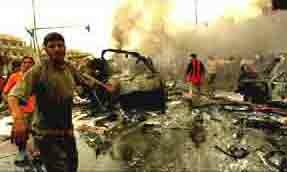The Iraq War has been long forgotten and treated as a "mission abolished" after the new president pledged to withdraw U.S. forces and the American media, public, and Congress turned their attention back to a war even liberals could love (or at least support) — Afghanistan.
Liberals wanted to refocus on the real war on terror - even though it’s not chic to call it that under the new Democratic administration. But what about poor Iraq? As baseball great Yogi Berra once said, "It ain’t over, till it’s over." And the underlying indicators seem to indicate that the worst is yet to come. Although even the starry-eyed Bush administration eventually seemed to figure out — and the Obama team is much more realistic than they were — that a unified, democratic Iraq was unlikely, the reduced violence has again lulled politicians into unrealistic expectations.
The only way Iraq can overcome its many ethno-sectarian and tribal divisions and remain unified is if a massive and prolonged civil war occurs, and the winning faction holds the fractured country together by force. Otherwise, the artificial country is likely to break up into warring city-states, each with its own militia. There are multiple signs that Iraq is broken beyond repair. Here are some examples:
- The Iraqi parliament is fractious and completely dysfunctional. The various factions have rendered that body unable to pass vitally needed laws — for example, an oil statute to divide oil revenues and entice international oil companies in to repair Iraq’s decrepit oil production infrastructure and increase output. The lack of an oil law recently led to a disastrous auction of the rights to work in Iraq’s oil field, with only one agreement reached with foreign oil interests.
- After six years of training by the U.S., only 17 of the Iraqi Army’s 174 combat battalions can conduct counterinsurgency operations without U.S. help. All of the Iraqi army depends on the U.S. military for logistics, intelligence, and air support.
- U.S. forces are so roundly hated in Iraq that U.S. military trainers have to quarantine themselves in fortified compounds separate from the Iraqi soldiers for fear of being fragged by those they trained.
- Factionalism is shown by the Shi’ite government’s failure to implement a law permitting former Ba’ath Party members (mostly Sunnis) to return to their jobs or receive pensions. Furthermore, the government had agreed to pay Sunni Awakening Council members — those former Sunni guerrillas that are now helping the U.S. to fight al-Qaeda in Iraq — but has dragged its feet on getting them their money. In addition, the government, suspicious of the Awakening Councils, has also slow rolled its promise to get their members jobs in the security forces, bureaucracy, or private business. Instead of so co-opting this potential enemy, the government dangerously began arresting Sunni leaders.
- Much resentment still exists over the rampant ethnic cleansing between the ethnic Shi’ite and Sunni groups that occurred in 2006 and 2007. If refugees are allowed to return to their homes, more violence would likely flare.
- Volatility in various areas of Iraq has fluctuated since the U.S. invasion. Now the most severe strains are in the north, with ethnic tensions and violence between the Kurds and the Sunni Arabs over the border between the Kurdish area and the rest of Iraq, especially the oil-rich territory near the northern city of Kirkuk.
- In fact, ethno-sectarian violence is already increasing, and is especially likely after August 2010, when U.S. combat forces are all pledged to be out of Iraq and cannot easily return there. The various factions have astutely reasoned that dissipating their men and arms by fighting the powerful — but "so yesterday" — U.S. military occupation is foolish. They are keeping their powder dry for the main event between themselves as U.S. forces become weaker. The Sunni Awakening Councils, formerly fighting the U.S., even got the U.S. to give their militias money, arms, and training — which will likely make the coming conflagration even worse, as they battle the U.S. trained and equipped Kurdish and Shi’ite units (really militias) in the security forces.
- Basic services have improved somewhat but are still lousy, with continuing power outages and a lack of clean water.
- The worldwide economic collapse has lowered oil prices and has impeded the Iraqi government’s ability to buy peace among the obstreperous factions.
A country’s government can make all of the laws and create all of the institutions it wants, but those things will all be for naught if the underlying forces of ethnicity, sectarianism, and tribalism are strong enough to pull the country apart. Those forces in the form of factions in Iraq are well armed and prepared to do just that whenever the Americans inevitably become so weak that they can’t do much about it.
The only way to avoid this train wreck is to withdraw U.S. forces as soon as possible, so that they don’t get caught in the melee, and hold a national conclave as the draw down. That conclave would let the Iraqis attempt to divide the country peacefully and agree on boundaries that would be honored by all. A central government could be retained, but it would have to be weak so that the various factions would not fight over control of it. Decentralization is Iraq’s only hope to avoid a massive civil war.
Source: Ivan Eland (Antiwar)
July 03/09


